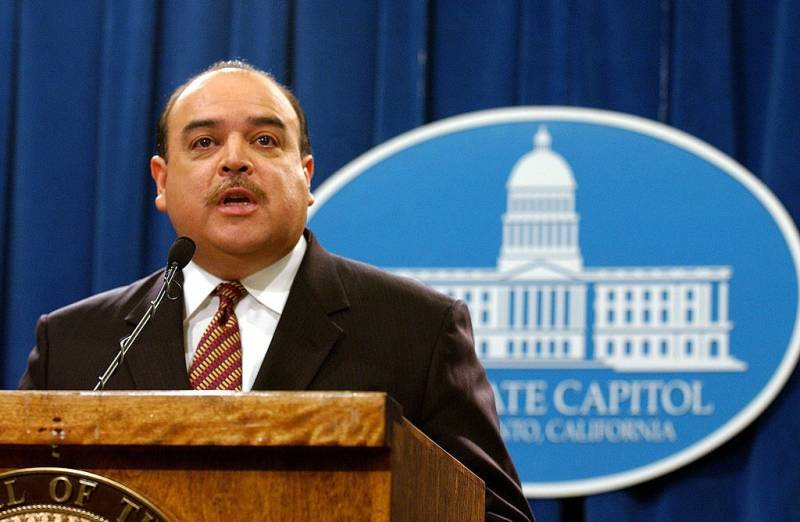Walsh believes that the entrance of a major Democrat into the replacement race completely reshuffled the recall deck.
“Once Cruz Bustamante made that decision to get into the race, it was like the breaking of the dam,” Walsh said. “All bets were off [because if] a Democrat thinks that Gray Davis isn’t doing what he should be doing and he’s the lieutenant governor, well, my goodness then there is something to be had here. … And it opened up.”
At the time, Davis’ approval ratings were historically low – in the 20s. So beating the recall was always going to be a tough climb.
But South says by jumping in, Bustamante caused even more problems for Davis. For one, it upended the message that the recall was a Republican plot, an effort to reverse results of an election that happened less than a year earlier. And some voters saw it as a kind of twofer — a way to replace the disliked Davis with the first Latino governor.
“So Arnold was clearly our biggest problem, but Bustamante was a close second,” South said.
Bustamante — a Central Valley Democrat — had a hard time raising money and was no match for the star power of Schwarzenegger.
“I knew what the consequences would be. If I lost, it may shorten my career. And I made the decision to run despite that,” Bustamante said.
Looking back now, Bustamante describes his decision to run as “selfless.”
“Frankly, I was taking one for the team,” he said, meaning the Democratic Party.
But “the team” sure didn’t appreciate it. Not only was Davis recalled, but Bustamante finished with just 31% of the vote, far behind the winner.
Three years later, Bustamante — who was still lieutenant governor — ran for state insurance commissioner, losing to a novice Republican, Steve Poizner. That made him the last incumbent Democrat to lose a statewide election.
So if Bustamante had it to do over again, would he make the same choice?
“We all make decisions in life, and if you know what the outcome is going to be and you can you still make that decision, then I have no regrets,” Bustamante said. “So whatever came after that, is it good or bad? It just is. I’m very at peace with all of that. I have no regrets.”
To Democrats like Garry South, Bustamante was a big reason Davis lost. Not surprisingly, Bustamante views things differently.
“I think they were looking for someone to use as a scapegoat and they have for the last two decades said continuously that he lost because of my entering the race,” Bustamante said.
He’s not alone. Fernando Guerra, a political science professor at Loyola Marymount University in Los Angeles, says Davis’ loss was due to bigger factors than his lieutenant governor being in the race.
And Guerra thinks now it’s a mistake for Democrats to count on Newsom being popular enough to beat back the recall, which will likely be held in November.
“What happens if there are tremendous wildfires out of control and the state doesn’t respond appropriately? What happens if the scandal with the Employment [Development] Department continues and gets even worse? What happens if there is another French Laundry moment? Given his career? He’s very capable of doing that,” Guerra said.
By stopping Democrats from running, Guerra says, the party runs the risk of “handing the governorship to a Republican.”
“That is political malpractice. The Democrats need to have a strategy and be prepared and coordinated,” he said.
Eighteen years later, Bustamante dismisses the current recall against Gov. Newsom and does not think it’s necessary for a Democrat to run.
“This recall is improper and without merit,” he said, adding that unlike Davis, “I think, frankly, that Newsom is going to win handily.”
Nonetheless, Newsom’s advisers are circling the wagons to make sure no other Democrat jumps into the race while his campaign focuses its fire on Republican challengers, including the latest entrant, Caitlyn Jenner.

